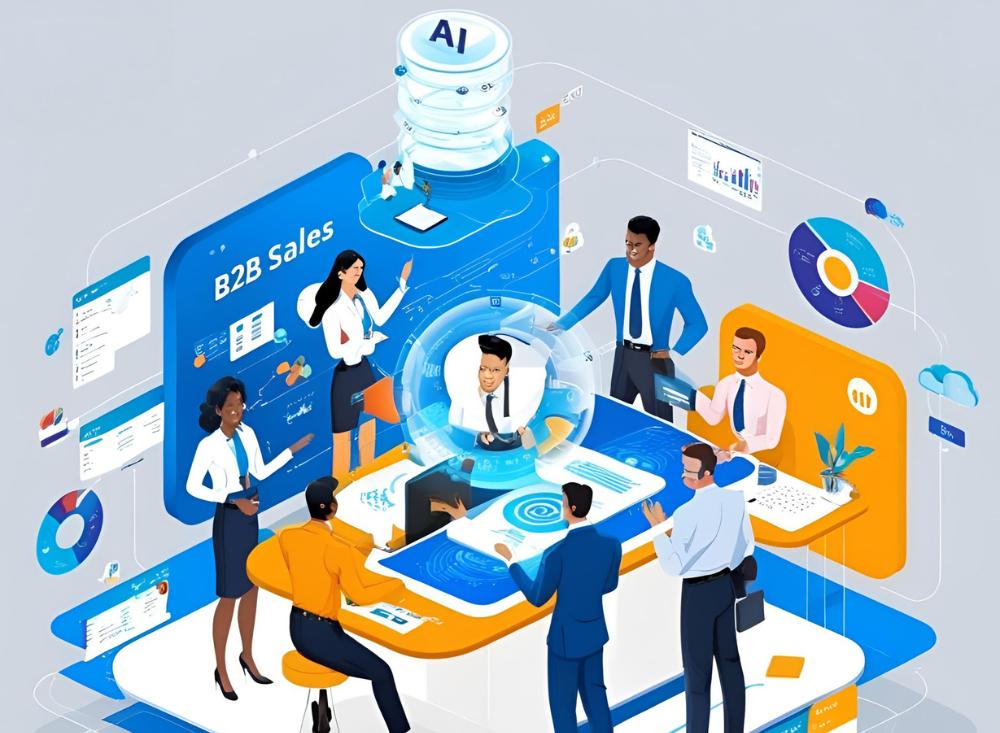
The B2B sales landscape is evolving rapidly, and artificial intelligence (AI) is playing a pivotal role in reshaping how businesses engage with prospects, close deals, and retain customers. AI-powered automation is no longer a futuristic concept — it’s a necessity for staying competitive.
But how exactly is AI transforming B2B sales, and how can companies leverage it effectively? Let’s explore.
How AI is Revolutionizing B2B Sales
1.Smarter Lead Scoring & Prioritization
AI analyzes vast amounts of data — such as past interactions, firmographics, and engagement signals — to identify the most promising leads. Instead of manual guesswork, sales teams can focus on high-intent prospects most likely to convert.
2.Hyper-Personalized Outreach
AI enables dynamic content customization by analyzing buyer behavior, industry trends, and past communications. Sales teams can craft tailored messaging at scale, increasing response rates and engagement.
3.Predictive Analytics for Better Decision-Making
By examining historical sales data and market trends, AI predicts which deals are most likely to close, which accounts may churn, and the best next steps for sales reps. This reduces wasted effort and improves forecasting accuracy.
4.Automated Follow-Ups & Engagement
AI-driven automation ensures timely follow-ups based on prospect behavior. Whether it’s sending a reminder after a meeting or nudging a stalled deal, AI keeps the sales process moving efficiently.
5.Enhanced Customer Insights & Relationship Management
AI analyzes customer interactions across emails, calls, and meetings to provide actionable insights. Sales teams gain a deeper understanding of buyer sentiment, objections, and preferences, allowing for more strategic conversations.
6.Real-Time Sales Coaching
AI can evaluate sales calls and emails, offering real-time feedback on tone, objection handling, and messaging effectiveness. This helps reps refine their approach and close deals faster.
How to Successfully Implement AI in B2B Sales
1.Start with Clear Objectives
Define what you want AI to solve — whether it’s lead scoring, reducing response times, or improving forecasting. Align AI adoption with your sales goals.
2.Integrate AI with Existing Workflows
AI should enhance, not disrupt, your sales process. Ensure seamless integration with your CRM and other sales tools for a unified workflow.
3.Train Your Sales Team
AI is most effective when sales teams understand how to use it. Provide training to help reps interpret AI-driven insights and apply them in real-world scenarios.
4.Continuously Optimize & Refine
AI models improve with data. Regularly review performance metrics and adjust strategies based on AI-generated recommendations.
5.Maintain a Human Touch
While AI handles repetitive tasks, human intuition and relationship-building remain irreplaceable. Use AI to augment — not replace — personalized interactions.
The Future of AI in B2B Sales
As AI technology advances, its role in B2B sales will only grow. From intelligent chatbots handling initial inquiries to AI-powered negotiation assistants, the possibilities are endless. Companies that embrace AI-driven automation today will gain a significant competitive edge in efficiency, accuracy, and customer satisfaction.
Final Thoughts
AI is not just a tool — it’s a game-changer for B2B sales. By leveraging automation for lead prioritization, personalized outreach, and predictive insights, sales teams can work smarter, close faster, and build stronger customer relationships.